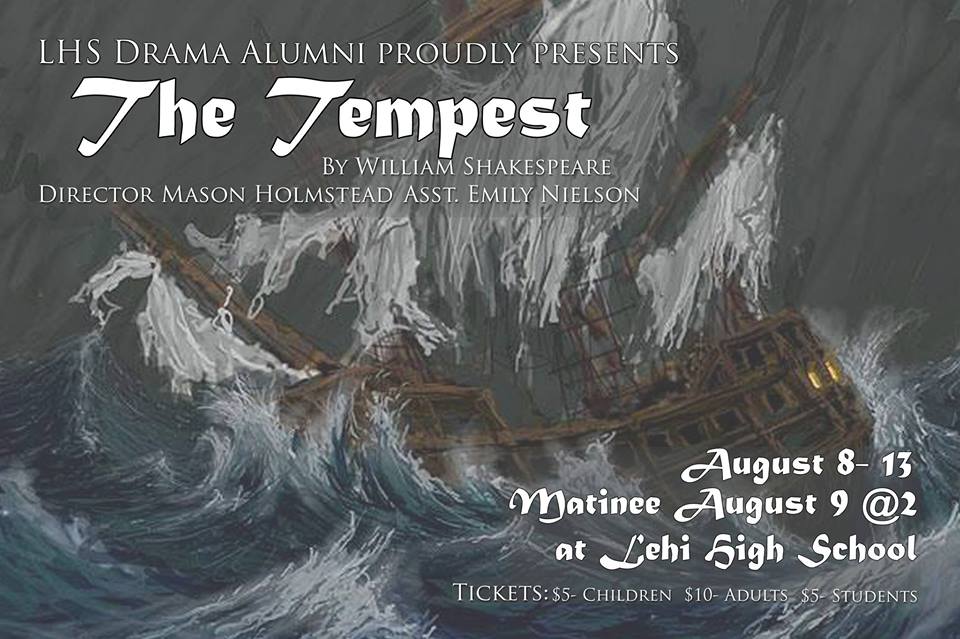LEHI — Strange magic exists in Shakespeare‘s The Tempest. When Propsero is cast off from his rightful place as Duke of Milan, he and his daughter Miranda must rely upon his magic to survive on the island of their wreckage. Through magical arts, Propero frees and enlists the help of mischievous spirit Ariel, and binds the strange monster Caliban in service to him.

It is this same magic that allows Prospero to entrap his brother, Antonio, upon the island by conjuring a mighty storm. Antonio and all aboard the ship are wrecked and, as designed by Propsero, the King of Naples’s son falls in love with Miranda. In marrying her, Miranda would be restored to her birthright, and Prospero could return to his homeland. The magician relies upon his trickster spirit to lure his usurping brother closer, to oust Antonio’s plans to kill the King of Naples, and enact penultimate vengeance. Prospero learns forgiveness, and in poetic transcendence, releases his servant Ariel and gives up his magic, to return home.
I appreciated the beautiful incorporation of “theatre magic” into this particular production. So many others I have seen rely solely upon imagination, or tawdry tricks to make up the island’s mysterious sense of magic; however, Director Mason Holmstead brought an emphatic vision to his interpretation, and executed as much with a very clean precision. Most noticeably, the stage front was manipulated to accommodate a pool of water, the edges of which disappeared into the stage. It was really quite lovely to see this used as an entrance/exit for Ariel, and the addition of water into the scenery somehow made the stage feel much larger. Water became representative of the sea, of grottos, and grounded the mystical island in something much more tangible.
Scenic design (Matthew Lenhart) included a stunning island world, and I loved that the audience was invited to be a part of that by seating the audience on the stage. This gave an intimate perspective to the show and allowed for actors to pull the audience into the narrative. Slats around the pool, fog machines, and more created an overall hidden island feel. Lighting (Josh Fawcett) served to create a mystical grotto and played with color to create a vibrant, lush result.
However, the costumes (McKenzie Florence) didn’t necessarily feel cohesive with the rest of the show, simply because they did not seem to match the same level of careful execution as the other technical elements. Stage and lighting and atmosphere were so tight and precise, that the almost hodge-podge nature of some costumes didn’t feel finished. Yet, I loved Caliban’s outfitting, and Miranda and Prospero felt suited to their breezy island home.
The actors provided a strong performance, and I was appreciative to care given to enunciation and elocution. Shakespeare can be tricky, with the ornate language, and it was easy to hear every line. Stage layout, too, could have easily caused difficulties in the sight lines and hearing actors, but I was able to see and hear every scene from my seat. My own familiarity with the story helped to delineate plot.
I did find myself a little frustrated with some of the name changes. Relation to original script was not immediately clear, and so I was left wondering exactly who some of those people were. Relationships were not clear among characters, and I could hear a few audience members saying, “I have no idea what’s going on.” But other changes in usual representation of character—namely splitting the role of Ariel between two actresses—worked to great effect. I appreciated the boldness in Holmstead’s differentiation of ” Light Ariel” (Jessica Butler) and “Dark Ariel” (Cree Amendola), and thought the two actresses tasked with this challenges undertook it with ease. Their mannerisms were similar, and speech patterns reflected a pleasing symmetry. Physical representation of Ariel really uplifted and supported the production’s notions of magic.
Initially, I was put off by Miranda’s (Haley Florence) persistent melancholy. She has potential to be such a sweet, ingenue and I thought the interpretation made her seem aged beyond her years. However, when met by Ferdinand (Thayne Caldwell), there was a luminous shift in her character that revealed an absolutely adorable innocence that afforded for delightful chemistry. I enjoyed Caldwell’s earnestness in his Ferdinand too, and thought the tenderness he regarded Miranda with really elevated that relationship. Prospero (Kyle Baugh) performed with a gravity and elegance, that gave him control of the stage. Baugh had a particular talent at bringing the audience into Prospero’s world, which boosted the show; Baugh also showcased a wisdom necessary to the role. There seemed to be some discrepancy in style, however. I liked the more caricatured nature of the clowns, but when transferred to Antonia/Antonio and Sebrine/Sebastian, made the nature of their sedition somehow less serious. I would have liked to see their treachery founded in the same sort of grounded presentation offered by others in the cast.
Despite these particulars, I really quite enjoyed my evening at this show. A more deliberate representation of “magic'”created a definite air of excitement and energy within the theater, and actors executed the fun script with aplomb. I appreciated the immersive environment that was established from the first moment of entering the theater, and left with that same sense of delightful mysticism. Of note– those involved with this play are members of the Pioneer Alumni Repertory Company, and put on this piece to benefit the current Lehi High School drama program. If this is the calibre of Lehi High School alumni, I would strongly suggest venturing down to this production and supporting the current talent pool cultivating there.
[box type=”shadow”]The Pioneer Alumni Repertory production of The Tempest plays nightly through August 13 at 7 PM at Lehi High School (180 N. 500 E., Lehi). Tickets are $5-10. For more information, visit https://www.facebook.com/events/522825134530711/.[/box]
